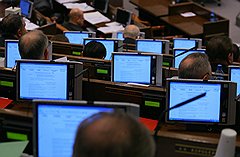Ли Куан Ю: «Все должны учить английский, а родной язык должен стать вторым языком»

Ли Кван Ю: «Моей тактикой всегда было недооценивать свои будущие достижения и достигать большего, чем то, что я обещал»
Вчера 87-летний создатель «сингапурского чуда» и один из самых ярких политиков эпохи Ли Куан Ю объявил об уходе с поста министра-ментора Сингапура. После 30 лет правления страной в должности премьер-министра и семи лет в роли наставника правительства Ли уходит, чтобы «дать дорогу молодым». За эти годы ему удалось превратить Сингапур из бедной рыбацкой деревушки без доступа к каким-либо природным ресурсам в процветающее государство, где практически отсутствует коррупция, а население — одно из самых благополучных и образованных в мире.В последние годы Ли Куан Ю часто приезжал в Россию. Несколько лет назад президенту школы Сколково Рубену Варданяну удалось убедить министра-ментора войти в попечительский совет еще даже не построенной школы. И теперь Ли Куан Ю охотно приезжает в Москву и выступает перед студентами Сколково, вручает им студенческие билеты и дает советы.
«Ты говоришь по-китайски?» — спросил меня Ли Куан Ю на одной из таких встреч. В 50-х годах прошлого столетия Сингапуру удалось совершить рывок в развитии благодаря настойчивому стремлению Ли Куан Ю сделать английский язык основным в своей стране. Теперь, когда большинство сингапурцев свободно общаются между собой по-английски, Ли Куан Ю все чаще говорит о необходимости учить китайский язык и активно вводит его в местных школах. Отчасти этим был обусловлен и мой выбор стартапа ChineseOnline.ru — к мнению Ли Куан Ю стоит прислушаться.
У Ли Куан Ю есть чему поучиться не только студентам бизнес-школы, но и многим российским политикам и чиновникам. Он неравнодушен к России и верит в ее будущее. Но предупреждает, что нам «нужно запастись терпением».
Несмотря на преклонный возраст, Ли Куан Ю сохраняет поразительную ясность и информированность в деталях о том, что происходит сейчас в мире, в том числе и в России. Ну и, конечно, у него отличное чувство юмора, которое позволяет ему моментально расположить к себе аудиторию. Хочется надеяться, что здоровье позволит ему приехать к нам еще не раз.
Ну а ниже я предлагаю прочитать выдержку из его встречи со студентами Сколково.
— Кто в вашей жизни оказал на вас самое большое влияние?
— Я хотел стать хорошим, преуспевающим юристом. Чтобы стать юристом в стране, которой правят британцы, где все судьи и прокуроры — британцы, мне пришлось стать таким же британцем, выучить британский английский, я учился в университетах и лучших юридических школах. По возвращении на родину я поступил на работу в британскую юридическую школу. Спустя какое-то время я стал работать с профсоюзами, потом выиграл на выборах, а мой босс проиграл. Он сказал мне, лучше бы тебе уйти, и я сразу превратился из младшего партнера в безработного.
После этого я основал собственную фирму вместе с одним из своих близких друзей. Я начал лучше разбираться в деле, изучать новые технологии. Необходимо интересно представить ваше дело, тогда люди будут вас слушать. Все время учишься чему-то новому. Потом я занялся политикой.
— Вы один из наиболее успешных борцов с коррупцией. Насколько это выполнимая задача?
Мы — необычное государство. Оно было достаточно коррумпированным до того, как мы пришли к власти. До этого у нас заправляли британцы. Они делились властью с местными министрами и во время переходного периода наделяли их все большими полномочиями. Эта передача власти со временем стала все чаще сопровождаться взяточничеством — подарки, еще подарки, потом деньги и т. д.
Когда мы пришли к власти, мы решили положить этому конец — иначе мы не смогли бы выжить. Наши соседи обладают огромными ресурсами — нефтью, газом, лесом, у них есть реки и гидроэлектростанции. Мы всего лишь небольшой остров. Как нам выжить? Мы должны были начать жить по другим принципам: ты взяточник, а я нет, ваша экономика малоэффективна, а у нас все наоборот. В вашей стране небезопасно жить, а в нашей безопасно. Женщина может решить сделать пробежку в три часа ночи, и ей ничего не угрожает. Как мы добились всего этого? Прежде всего мы дали людям понять, что, если мы не пойдем своим собственным путем, мы не выживем.
У нас нет ни нефти, ни газа, но у нас есть крупнейший нефтеперерабатывающий и нефтехимический комплекс во всем регионе. У нас работают все крупнейшие компании. Почему? Благодаря стабильности, сохранности инвестиций, эффективности и надежности. Я приведу пример. В 1973 году арабские страны ввели нефтяное эмбарго, чтобы выразить протест против того, что США поддерживают Израиль. Все эти страны разом заявили, что вся нефть в нефтехранилищах, принадлежащая другим людям, на самом деле принадлежит им и ее нельзя продавать.
Я решил, что, если мы хотим процветания, не надо вмешиваться в этот конфликт. Я позвонил нефтяникам и сказал: если вы собираетесь вести дела как прежде и если вы считаете, что потери должны распределяться на всех — все будут получать только часть того, что получали раньше, — мы готовы разделить эту позицию.
Они не забыли об этом. Сегодня, во время рецессии, инвестиции ExxonMobil в Сингапур составляют $12 млрд, до того как Exxon поглотила Mobil, они составляли $6 млрд. Они собираются дополнительно инвестировать $4,5 млрд, таким образом, общая сумма инвестиций составит $16,5 млрд.
Почему это происходит? Потому что они уверены, что мы не откажемся от своих обязательств. России после того, что произошло с западными нефтяными компаниями, понадобится много времени, чтобы этого достичь. Я не пытаюсь судить, кто был прав, а кто виноват. Я говорю о том, что, когда мы подписываем контракт, мы тщательно изучаем его условия. Мы либо подписываем его, либо нет. Но если мы подписали его, мы обязаны выполнять его условия, какими бы они ни были.
Необходимо доверие, необходимо признавать тот факт, что в результате сделки вы можете оказаться в проигрыше, но в долгосрочной перспективе вы выйдете победителем.
Далее, читайте на: http://www.forbes.ru/ekonomika-opinion/lyudi/67927-li-kvan-yu-vse-dolzhny-uchit-angliiskii-rodnoi-yazyk-dolzhen-stat-vtor









